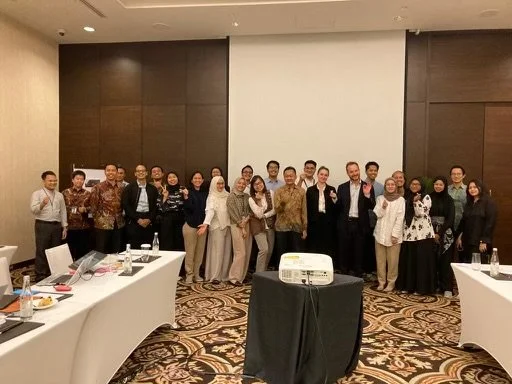Latest
-
![Capacity building with Bank Indonesia]()
Capacity building with Bank Indonesia
Jakub and Franziska on behalf of the 1in1000 team organised capacity building with staff from the central bank of Indonesia in Jakarta in September 2023. During 4 days of workshops, the team explained key concepts of climate risk analysis and management and transferred knowledge on how to apply the 1in1000 TRISK climate transition risk stress test model in practice.
-
![]()
How can we integrate dynamic portfolio assumptions into climate stress-tests?
Addressing the question of whether portfolios should be ‘static’ or ‘dynamic’ in the context of long-term stress-tests and scenario analysis is a key question for the NGFS members and financial institutions. To date, there is limited research on the options and implications of how to address this issue. The 1in1000 programme is releasing a new report that explores 4 different avenues to adjusting assumptions around portfolio exposures, their pros and cons, and the potential impacts of dynamic portfolios on the results of stress-tests using a sample portfolio.
-
![]()
This is the way…or is it? The impact of climate scenario choice on stress-test outcomes across 5 climate scenarios
The choice of scenarios in climate stress-test are generally recognized to be a key determinant of the outcomes of stress-test models. Climate scenario variables are the ‘value drivers’ that determine the production profiles of products and services and the evolution of both regulatory and market costs and prices. In light of the importance of scenarios, the Network for Greening the Financial System (NGFS) has selected a set of discrete scenarios designed to form the basis of their climate scenario and stress-test exercises. This note is the first public exercise quantifying the correlation between stress-test model outcomes using different scenarios, with a focus on the power sector.
-
![]()
1in1000: Theia teams up with Oxford to develop climate stress testing models
Theia Finance Labs (formerly the 2° Investing Initiative Deutschland) and the University of Oxford Sustainable Finance Group (OxSFG) are excited to announce close collaboration on climate risk models under a shared brand name ‘1in1000’. 1in1000 will be the home of the two organizations’ suite of open-source climate and environmental financial risk models, including Transition Risk (TRISK), Physical Risk (PRISK), Nature Risk (NRISK), and Social Risk (SRISK).
-
![]()
New published paper: Toward a Framework for Assessing and Using Current Climate Risk Scenarios Within Financial Decisions
In response to a growing awareness of the potential impact of climate change on financial stability, academics, financial institutions (FIs), central banks and supervisors (CB&S) have developed a suite of scenarios and analytical tools to assess forward-looking climate-related financial risks. We argue that all scenarios are wrong, but this does not necessarily mean that they cannot be useful if used and expanded upon with full awareness of the limitations. In this paper, we analyse those limitations in the context of the specific requirements by FIs for scenario analysis and propose an approach to scenario construction and expansion to complement existing scenarios and increase their suitability for decision making for key financial use cases.
-
![]()
1in1000 research presented at the Bank of England Climate Capital Conference 2022
As part of the session “Understanding uncertainty in climate-related financial risks and its implication for capital” Moritz Baer and Matteo Gasparini contributed to the discussion with latest findings of their research which utilised the 1in1000 model suite.
-
![]()
TRISK - A climate stress test for transition risk
The TRISK submodule of the 1in1000 model suite was published as working paper on SSRN.
-
![]()
Are Central Banks Accounting for Climate Uncertainty Right and Does It Matter? New research out by 1in1000 authors together with the University of Oxford
Different studies show that climate change might have a significant impact on financial stability, but very few discuss how this could change depending on the many different ways climate risks could unfold. In this paper we explore the impact of three possible mitigation scenarios in a consistent climate stress test model. We show that the impact of the net zero transition on companies valuations, and consequently on the financial system, varies for the same emission target (below 2C) depending on how the transition will unfold. We argue that expanding the breadth of scenario narratives could significantly improve our understanding of climate-induced uncertainty and we discuss some implications
-
![]()
Are climate risk scenarios fit for purpose?
Authors from the 1in1000 initiative have contributed to a report led by the Centre for Greening Finance and Investment (CGFI) that assess the adequacy of climate scenarios for the financial sector
-
![]()
1in1000 launches climate stress-test simulation game, in partnership with SOAS Centre for Sustainable Finance
The 1in1000 program on long-term risks, in partnership with the SOAS Centre for Sustainable Finance, has launched a new climate stress-test simulation game that allows users to simulate different strategies and choices around the design of climate-related stress-tests and scenario analysis. The game was originally developed with the financial support of UN Principles for Responsible Investment and Climate-KIC.










